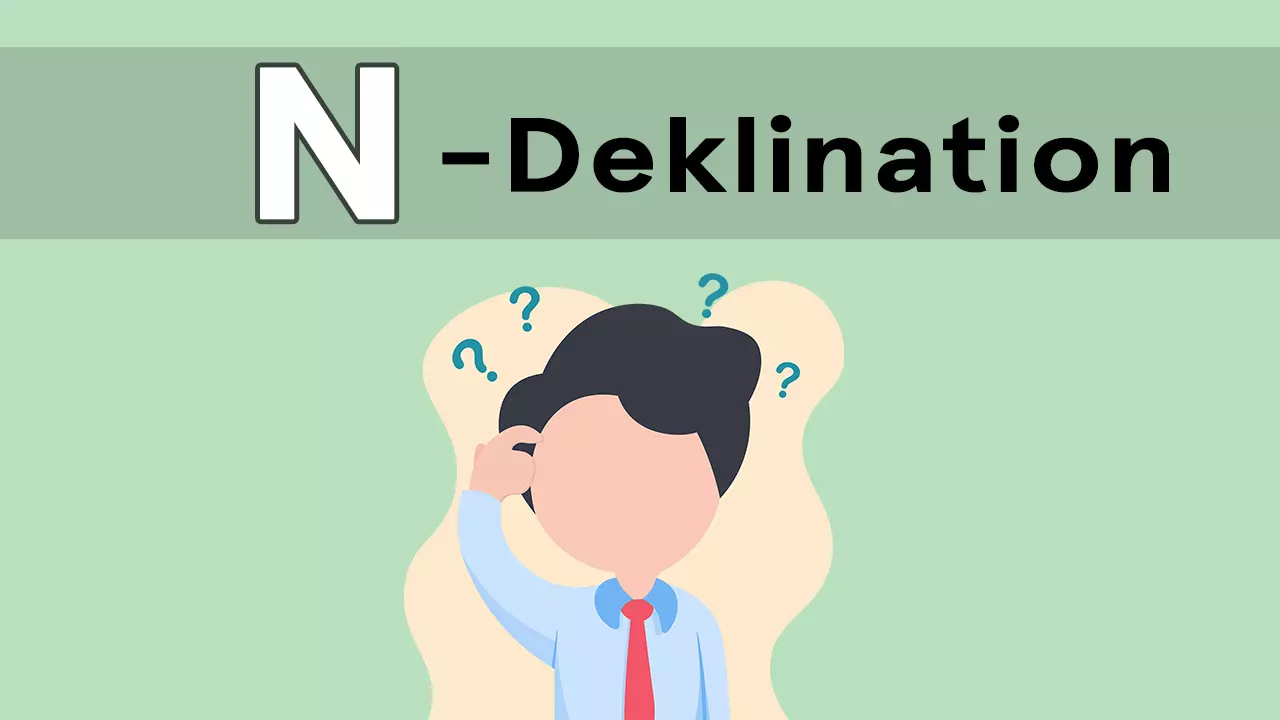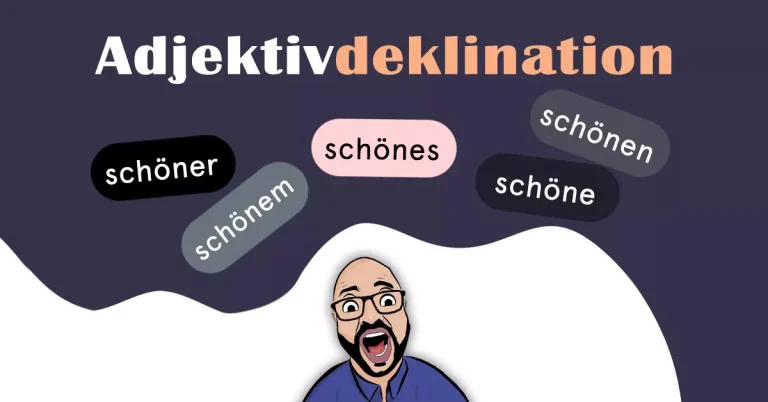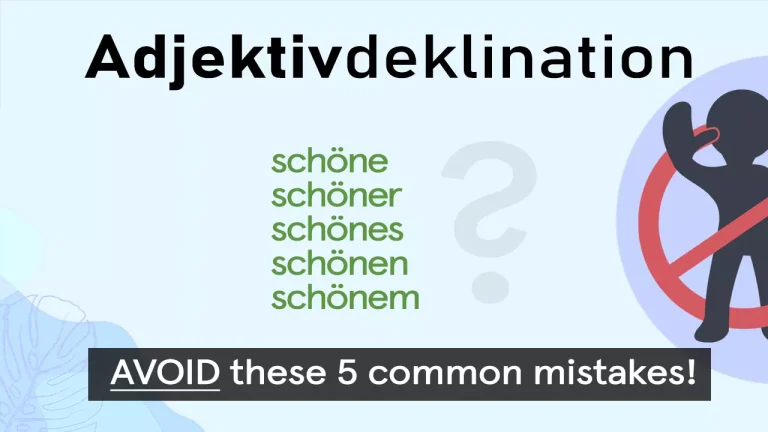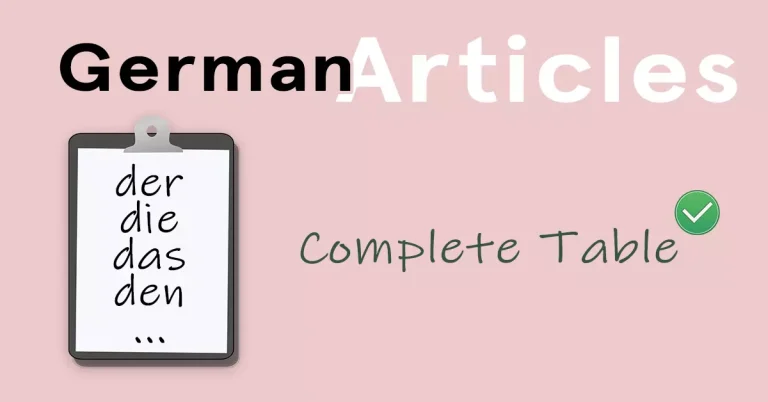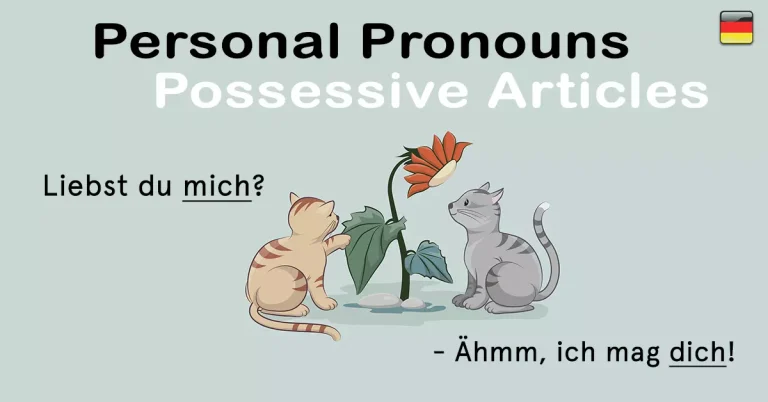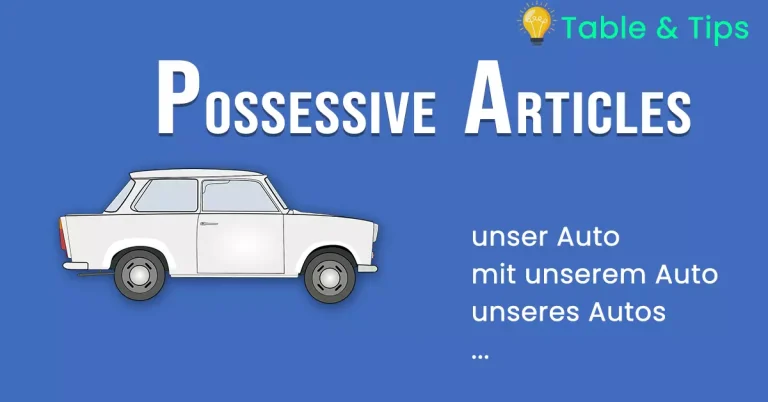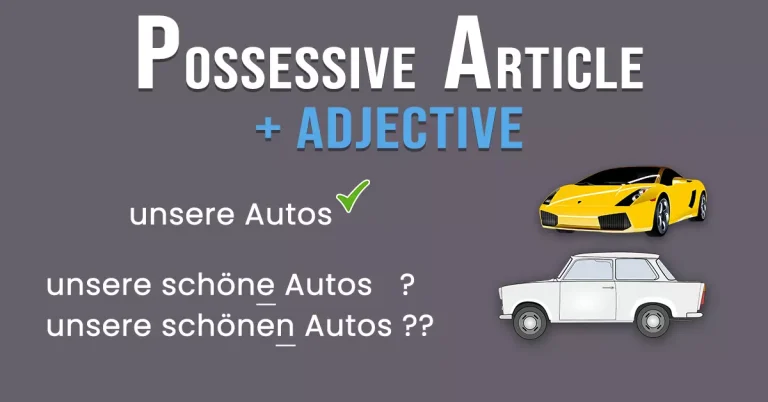In this article I will show you everything you have to know about the N-Deklination. It’s much easier than most learners of German think. If you memorize a handful of suffixes (endings) as well as 5-10 additional nouns you’re good to go!

Deklination (declension) basically means that you have to change the endings of articles, adjectives and (to a much lesser degree) also nouns in German. In most instances the noun does not change at all.
If you’re looking for a complete list of N-Deklination nouns please refer my other article on the topic.
Normal declension vs. N-Deklination
Let’s first of all compare a “normal” noun (der Mann – man) to a noun that has to be declined according to the N-Deklination (der Kunde – customer):
| Singular | Plural | |
| Nominativ | der Mann | die Männer |
| Akkusativ | den Mann | die Männer |
| Dativ | dem Mann | den Männern |
| Genitiv | des Mannes | der Männer |
| Singular | Plural | |
| Nominativ | der Kunde | die Kunden |
| Akkusativ | den Kunden | die Kunden |
| Dativ | dem Kunden | den Kunden |
| Genitiv | des Kunden | der Kunden |
The noun der Mann only changes in two cases: Genitiv singular where you add “(e)s” and Dative plural where we have to add “n”.
The N-Deklination noun der Kunde, however, changes for every singly form except for the first one – the nominative singular. In every other form (Akkusativ, Dativ, Genitiv in the singular and for all 4 cases in the plural) we need to add an “n”. You can see now where the N-Deklination got its name from. 🙂
Der Kunde ist sehr sympathisch. (Nominativ)
Ich kenne den Kunden seit langer Zeit. (Akkusativ)
Ich helfe dem Kunden gern. (Dativ)
Die Frau des Kunden ist auch sehr nett. (Genitiv)
Die Kunden haben gestern viel gekauft. (Nominativ Plural)
Ich mag die Kunden wirklich gern. (Akkusativ Plural)
Ich habe den Kunden viele Produke verkauft. (Dativ Plural)
Ich konnte alle Wünsche der Kunden erfüllen. (Genitiv Plural)
What nouns belong to the N-Deklination?
The nouns that are declined according to the N-Deklination …
- are mostly people and animals,
- mostly end in -e, -ist*, -ent*, -ant* -and*, -at* -graf*, -ot*, -ad*, -it* and -et* and
- a few other masculine nouns: der Herr, der Mensch, der Nachbar, der Bauer, der Bär, der Prinz, der Held, das Herz.
- These nouns are all masculine (exception: das Herz).
*Please note that we have to add “en” instead of just the “n” when the noun ends in “f”, “t” or “d”.
Now let’s take a look at some examples before I show you some specific cases and exceptions. Since (especially for the first three groups) there are a lot of nouns, I’ve included only the most important ones in this article. If you’re looking for a complete list of N-Deklination nouns please refer my other article on the topic.
Most important N-Deklination nouns that end in “e”
| der Affe | monkey |
| der Brite | Briton |
| der Buchstabe* | letter (i.e. a, b, c…) |
| der Bulgare | Bulgarian |
| der Chinese | Chinese |
| der Däne | Dane |
| der Experte | expert |
| der Franzose | French |
| der Gedanke* | thought |
| der Grieche | Greek |
| der Hase | rabbit |
| der Junge | boy |
| der Kollege | colleague |
| der Kunde | client |
| der Löwe | lion |
| der Name* | name |
| der Pole | Pole |
| der Portugiese | Portuguese |
| der Wille | will |
*See the two subchapters on the exceptions below regarding these nouns.
Most important N-Deklination nouns that end in “ist”
| der Egoist | egoist |
| der Journalist | journalist |
| der Polizist | policeman |
| der Terrorist | terrorist |
| der Tourist | tourist |
Most important N-Deklination nouns that end in “ent”
| der Agent | agent |
| der Assistent | assistant |
| der Konsument | consumer |
| der Student | student |
Most important N-Deklination nouns that end in “ant” / “and”
| der Demonstrant | demonstrator |
| der Doktorand | PhD student |
| der Konsonant | consonant |
| der Passant | passer-by |
| der Praktikant | trainee, intern |
Most important N-Deklination nouns that end in “at” / “ad”
| der Automat | (vending) machine |
| der Kamerad | comrade |
| der Kandidat | candidate |
| der Soldat | soldier |
Most important N-Deklination nouns that end in “et, “it, “graf”, “ot” and “soph”
| der Athlet | athlete |
| der Bandit | outlaw |
| der Fotograf | photographer |
| der Idiot | idiot |
| der Komet | comet |
| der Patriot | patriot |
| der Philosoph | philosopher |
Most important other N-Deklination nouns
| der Bauer | farmer |
| der Bär | bear |
| der Held | hero |
| der Herr* | Mr.; gentleman |
| das Herz* | heart |
| der Mensch | human |
| der Nachbar | neighbour |
| der Prinz | prince |
*See next to subchapters on the exceptions regarding these nouns.
Exceptions: nouns that differ from the normal N-Deklination endings
Exceptions 1: das Herz, der Buchstabe, der Gedanke, der Name
Das Herz is the only N-Deklination noun that is not masculine. Together with the nouns der Buchstabe, der Gedanke, der Name, it gets an extra “s” for the genitive case.
| Singular | Plural | |
| Nominativ | der Kunde | die Kunden |
| Akkusativ | den Kunden | die Kunden |
| Dativ | dem Kunden | den Kunden |
| Genitiv | des Kunden | der Kunden |
| Singular | Plural | |
| Nominativ | der Name | die Namen |
| Akkusativ | den Namen | die Namen |
| Dativ | dem Namen | den Namen |
| Genitiv | des Namens (!) | der Namen |
Exception 2: der Herr, die Herren
The noun “der Herr” gets an extra “e” in its plural forms.
| Singular | Plural | |
| Nominativ | der Mann | die Männer |
| Akkusativ | den Mann | die Männer |
| Dativ | dem Mann | den Männern |
| Genitiv | des Mannes | der Männer |
| Singular | Plural | |
| Nominativ | der Herr | die Herren |
| Akkusativ | den Herrn | die Herren |
| Dativ | dem Herrn | den Herren |
| Genitiv | des Herrn | der Herren |
If you’re looking for a complete list of N-Deklination nouns please refer my other article on the topic.
Exercises
Test your knowledge with exercises on this topic!
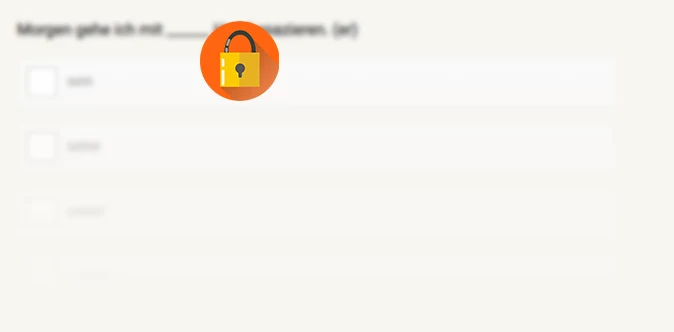
For DMM members only. You can sign up for free or make a voluntary monthly donation.
